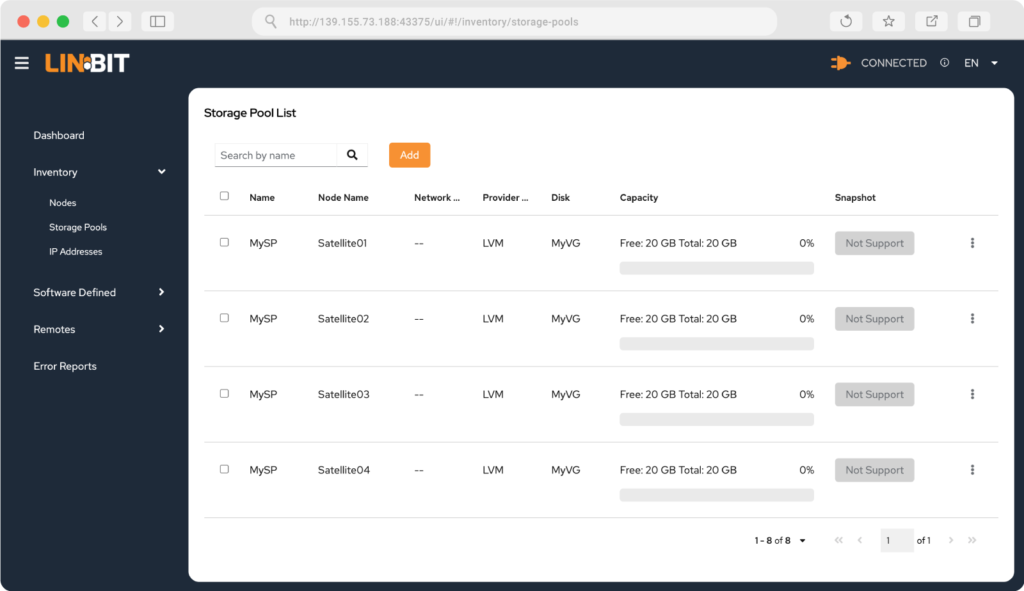LINBIT SDS is a comprehensive storage solution tailored for private cloud infrastructure. It includes the DRBD Kernel Driver, LINSTOR Volume Manager, an intuitive GUI that simplifies multi-cluster management, and 24×7 support.
LINBIT SDS Components
Kernel Driver
Volume Manager
Graphic User Interface
LINBIT Expert 24x7 Support
Solution Use Cases
Containerization
- Kubernetes
- OpenShift
- Rancher
- MicroK8s
- Nomad
Virtualization
- Apache CloudStack
- OpenNebula
- Proxmox
- OpenStack
- oVirt
- XCP-ng
Multi-Cloud Storage
- AWS
- Azure
- GCP
- IBM
Storage Gateway
- NFS
- iSCSI
- NVMe-oF
- Fibre Channel
How It Works
LINBIT SDS combines LINSTOR and DRBD open source software to provide high availability, scalability, and storage cluster management. DRBD offers efficient replication for high availability, especially for small-write-intensive workloads like databases and messaging queues.
LINSTOR, the SDS component, allows for abstracting physical storage, creating logical storage groupings, and deploying a large number of storage volumes easily. It seamlessly works with DRBD-enabled devices, facilitating automatic storage volume deployment to meet replication and node placement requirements.
A LINSTOR cluster consists of a management plane with controller and satellite services and a data plane with storage layers like DRBD. The controller handles storage configurations, while satellite services manage block storage within host systems.
The separate management and data planes enable satellite nodes to provide provisioned storage independently, even when the controller or satellite services are not running during updates or maintenance.

Latest LINBIT SDS Feature: GUI
The Graphical User Interface simplifies multi-cluster management and complex monitoring so your team can just go back to enjoying the power of Kubernetes persistent storage. Easy to install, easy to use.
Features:
- Storage pool dashboard with per node usage
- Built-in alerts and monitoring
- Simple Navigation system
Underlying Hardware Options
x86_64 (Intel/AMD)
Arm64
ppc64
s390x (LinuxOne)
Other
Public Cloud Storage

Features
- Open Source Software
- Geo-Clustering
- Distributed Storage
- High Availability
- Data Compression
- Snapshot Shipping
- Ultra Low Latency
- Thin Provisioning
- Remote Installation
- Tier 4 Availability
- Native RDMA InfiniBand Support
- Streamlined Configuration & Management
Technical FAQ
Is data consistency enforced in LINBIT SDS?
If you use the replication features of LINBIT SDS (DRBD), then yes. DRBD storage replication is fully synchronous by default. Volumes are RWO (read write once). Quorum and internal protocols determine whether or not a specific replica may be promoted (become RW).
Does LINBIT SDS architecture support multiple performance classes?
Yes, you can have multiple storage classes defined within LINSTOR. Each storage class could be backed by different classes of physical storage. Larger slower SSDs could make up one LINSTOR storage pool, while smaller lower latency NVMe devices could be used as another storage pool.
What platforms are supported?
- Red Hat Enterprise Linux
- SUSE Linux Enterprise Server
- Oracle Linux 6.3+
(RHEL Compatible or UEK) - Ubuntu Server Edition
Find out more on our Support Page.







LINBIT SDS Support Subscriptions
Below are our subscription tiers with up to 24×7 global support services. The LINBIT engineers are perfectly trained to help your team design, deploy, and support your infrastructure. Find our open source software here.
LINBIT Starter
Includes access to our certified repositories and Community non-SLA support.
- DRBD and LINSTOR Open Source features plus:
- Tech Guide for DRBD 9 and LINSTOR + Access to LINBIT's Extensive Documentation (Open Source)
- Self-service / Community Support (Open Source)
- Repository Access
- Latest Software Updates
- Online Training Workshop
Plus
Offers the addition of unlimited support tickets and remote installation support.
- All LINBIT Starter features plus:
- Updates, Including New Features
- New Packages on Request: Next Business Day
- Annual Health Checks
- E-Mail/Phone Support
- Unlimited Support Tickets
- Remote Installation/Troubleshooting by SSH/VPN
- Failover Testing
- Emergency Support
- Initial Support Response Time: 8 Hours Maximum
- Emergency Initial Response Time: 4 Hours Maximum
Enterprise
Offers 24x7 access to our expert support with our fastest turnaround times.
- All Plus features plus:
- New Packages on Request Within 24 Hours
- RDMA License for Fast Infiniband Replication
- Performance Tuning
- Support Engineer Assigned to Your Company
- Graphical User Interface
- Remote Support / Remote Management
- Initial Support Response Time: 4 Hours Maximum
- Emergency Initial Response Time: 1 Hour Maximum
- Dedicated Account Manager Assigned to Your Company
- Mail/Phone Support: 24x7
Your open source project is mission-critical so our team is here to help. We begin most relationships with a technical consultation. Reach out to LINBIT with your questions and project goals to begin today!
